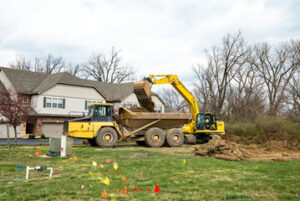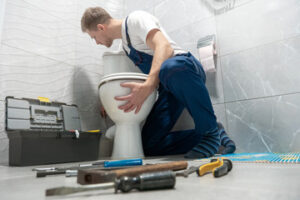The quality of excavation work has a direct impact on the success of commercial construction projects. Picking the right excavation contractor for your project can save you money and prevent costly delays.

These professionals perform essential services like digging foundation trenches and grading land. They also ensure that vital infrastructure is properly integrated into construction sites, ensuring the safety and functionality of new structures. Keep reading the article below to learn more about Excavating Contractor.
Construction projects of all sizes and types rely on excavation services to lay a foundation for the building process. From residential homes to industrial complexes, excavation helps construct the foundations, install utilities, and facilitate site development. The quality of excavation work is critical to a project’s success, as it sets the stage for long-term structural stability. The right excavating contractor can minimize risks and ensure that all aspects of the excavation and excavation process are done correctly, avoiding problems like structural instability and environmental damage.
Professional excavation contractors offer a broad range of site preparation services, encompassing everything from land clearing to soil stabilization. They are highly adaptable and adjust their approach to the specific needs of each project, ensuring that all elements of excavation are aligned with the project’s goals.
Before any dirt is moved, excavation contractors assess the site and create blueprints that guide how and where to dig. This includes determining the location of underground utilities and other features that need to be kept in place, such as water, sewer, and gas lines. This phase is important because it prevents issues that can derail the project, such as costly utility repairs or property damage.
Once the site has been surveyed and mapped, excavation services clear away any existing structures, vegetation, or debris to prepare the area for excavation. This may involve using heavy machinery like bulldozers to remove large tree stumps, dismantle old buildings, and haul away waste materials. The ability to effectively clear and dispose of waste materials is vital for meeting environmental regulations and ensuring worker safety.
During this time, contractors also conduct soil tests. This is an important step because it provides information about the soil’s strength, composition, and suitability for supporting structures. It can also help identify potential hazards, such as sinkholes and other structural failures. Excavation professionals can use this data to modify their excavation plans, preventing future problems.
In addition, this phase often includes grading and drainage corrections. This is because construction activities can affect the surrounding landscape, leading to erosion or flooding that impacts neighboring properties and natural resources. Professional excavation contractors take care to address these concerns by installing drainage systems, directing water flow safely away from the work area, and implementing measures to control sediment and erosion.
Integrating Vital Infrastructure
An essential part of excavation work is integrating vital infrastructure into the construction site. This includes digging trenches for sewage systems, electrical conduits, water lines and more. Without precise excavation, these systems might be misaligned, leading to expensive repairs down the line. A quality excavation contractor will plan carefully and execute their work to ensure these important utilities are integrated seamlessly into the building project.
Beyond laying the foundation for new structures, an excavation contractor’s work is crucial for land development and clearing projects. These contractors transform raw, undeveloped land into buildable lots while balancing ecological concerns with the need for development. This type of work involves earthmoving to create a stable base, laying the groundwork for roads and utilities, and managing drainage — all while protecting surrounding ecosystems.
In many cases, demolition of existing structures or vegetation needs to be completed before construction can begin. A qualified excavation contractor will manage the process by digging around and under these structures, ensuring they are safely removed. In addition, they will take care of buried utility lines and other underground infrastructure by digging carefully around them, avoiding damage and potential disruption to critical services.
In addition to these core services, an experienced excavation contractor will also offer a number of supplementary and specialty services. These include dry and wet excavation, utility trenching, and boring. Dry excavation removes dry, rocky, or solid dirt while wet excavation excavates muddy or moisture-laden material. Utility trenching digs narrow trenches for piping and other infrastructure, and is a vital step in construction because it helps to prevent utility line misalignment that can lead to expensive repairs later on. Finally, boring is a process that uses machinery to drill holes for poles, pipes, or other cylindrical structures.
Excavation Work
In addition to digging holes, excavation contractors often perform many other important tasks, including paving, milling roads, clearing the site and preparing it for the construction phase of new projects. They also help prepare residential and commercial paving to prevent drainage problems and ensure that the pavement will last longer, adding to the value of the property. They manage underground utilities and strategically plan the site to support the weight and structure of future developments.
Choosing the right excavation contractor is crucial for construction, landscaping, and utility installation projects. Asking the right questions can help you find a qualified professional who will meet your project’s specific needs and budget.
1. What Are Some Examples of Your Previous Work?
A reputable excavation contractor should have an impressive portfolio of past projects to show off. Ask them to provide you with contact information for references or online reviews from previous clients so you can see what others thought about their work. A lack of references or negative reviews should be a red flag.
2. Do You Have Liability Insurance?
The excavation process involves working with heavy machinery, so it’s important to choose a contractor who is fully insured and licensed. This protects you from liability if the contractor accidentally damages your property or someone else’s. They should also be able to supply you with proof of insurance in case you need to file a claim.
3. Will You Need a Permit for This Project?
Excavation projects often require permits, especially when digging in public spaces or near sensitive environmental areas. A reputable excavation contractor will know the regulations in your area and can secure the required permits quickly to avoid delays.
4. What Will Happen to My Yard During this Project?
Any major excavation job is going to disturb your lawn, so it’s important to ask the excavation contractor what they will do to minimize damage. They should be able to explain their process for keeping disturbances to a minimum and how they will handle the cleanup afterward.
Also, make sure to ask the excavation contractor about their safety protocols. They should be able to provide you with details on their training and the steps they take to keep workers safe, like securing unstable ground or handling equipment safely.
Choosing an Excavation Contractor
An excavation project is a significant undertaking that requires an experienced contractor. A faulty excavation can lead to serious construction problems down the line. It’s therefore crucial to select a contractor who prioritizes precision, safety, and compliance to ensure a successful project from the ground up. Effective research and evaluation can help you choose a top-notch contractor who is right for your needs.
Online Research: Conduct thorough research online to identify potential contractors in your area. Read reviews and gather information about each company’s experience, qualifications, and client testimonials. Personal recommendations from colleagues and peers are also a great resource. Interview and Site Visit: Meeting with multiple contractors in person allows you to evaluate their professionalism and communication skills, as well as assess their ability to meet your specific project requirements.
Ask About Their Past Work: Request photos and details about the projects each contractor has worked on. A portfolio is a good indicator of the quality of work that can be expected. Also, inquire about the types of equipment and technology they use. The right equipment can make a huge difference in ensuring quality and efficiency in the project.
Evaluate Their Credentials: Look for proof of license, insurance coverage, and professional affiliations. Licensing and insurance verification instills confidence in their legitimacy, while certifications and affiliations showcase their dedication to professional development and compliance with industry standards.
Ask for References: Get in touch with previous clients to learn more about their experiences working with the excavation contractor. Find out how long the project took, whether they were satisfied with the work, and if they would recommend them to others.
Consider Choosing a Contractor That Offers All the Services You Need: A full-service excavation contractor is a valuable investment, as it can save you time and money by handling all aspects of your project under one roof. You’ll also be able to eliminate the hassle of vetting and managing multiple contractors.
Inquire about each excavation contractor’s capabilities and pricing. Be sure to obtain detailed estimates that include costs, a timeline for completion, and any legal documentation or warranty information. Be wary of quotes that appear significantly lower than others, as they may indicate subpar quality or hidden fees. Choose a contractor who offers transparent pricing and clearly breaks down all costs in their proposal.



